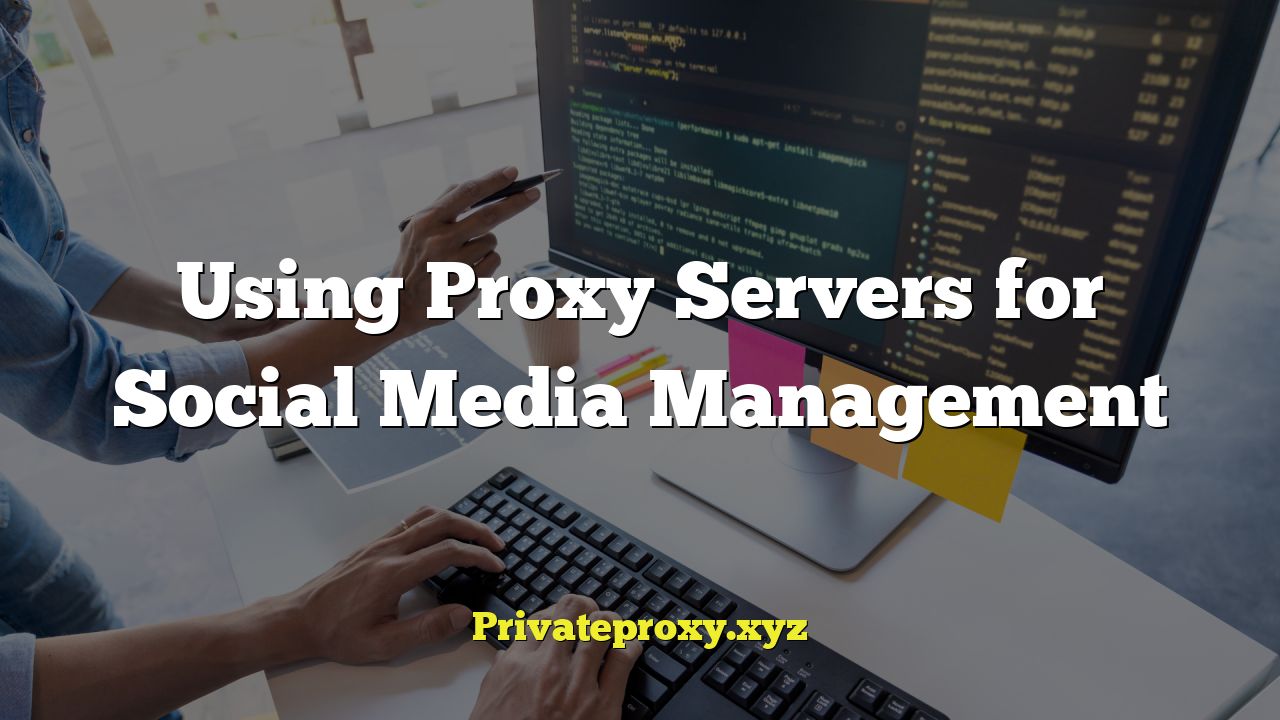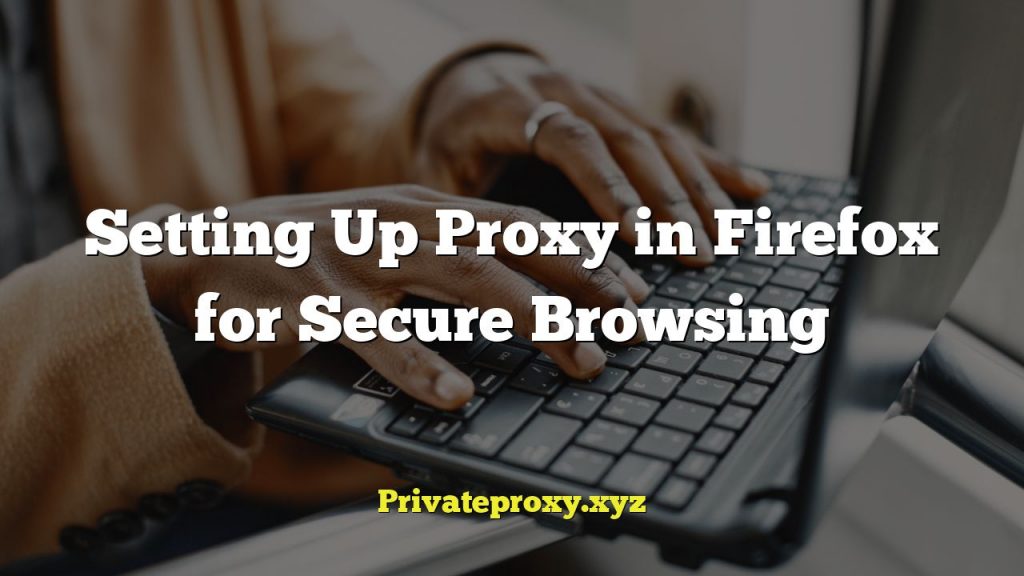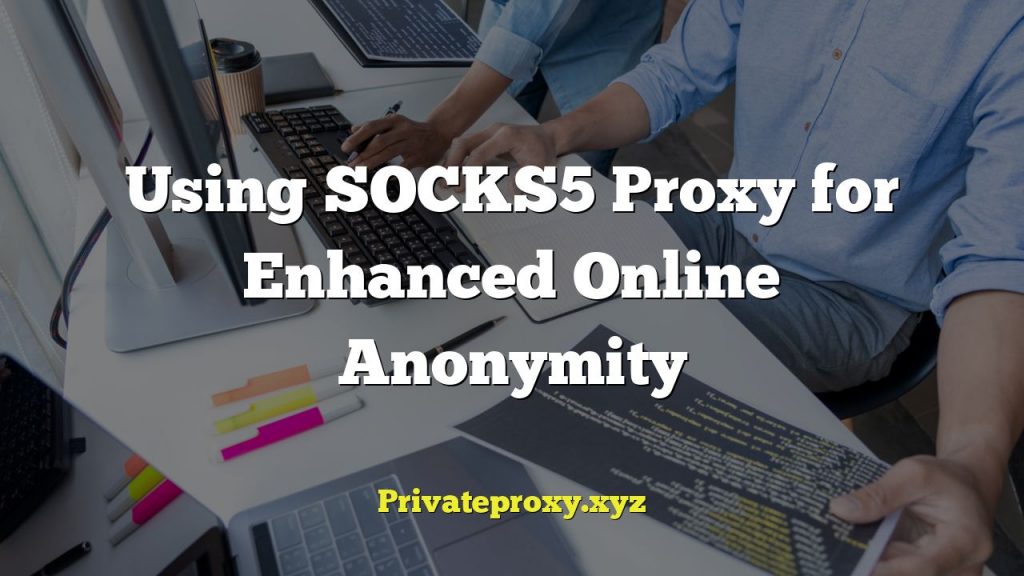
Introduction to Proxy Servers and Social Media Management
Proxy servers act as intermediaries between your computer and the internet. Instead of directly connecting to a website, your request is routed through the proxy server, which then fetches the content and returns it to you. This seemingly simple process has profound implications for social media management, particularly when dealing with multiple accounts, location-based restrictions, and security concerns.
Social media management involves a range of tasks, including:
- Creating and scheduling content
- Engaging with followers
- Monitoring brand mentions
- Analyzing performance metrics
- Managing multiple accounts
These tasks often require access to social media platforms from various locations or under different identities. This is where proxy servers become invaluable tools, offering benefits like anonymity, geo-location spoofing, and enhanced security.
Understanding Different Types of Proxy Servers
Not all proxy servers are created equal. They vary in terms of functionality, security, and cost. Choosing the right type of proxy is crucial for effective social media management.
HTTP Proxies
- Primarily designed for web traffic (HTTP and HTTPS).
- Suitable for basic tasks like browsing and accessing websites.
- May not offer the same level of security as other proxy types.
- Often used for general web browsing and bypassing basic geo-restrictions.
SOCKS Proxies
- More versatile than HTTP proxies, supporting a wider range of protocols (HTTP, HTTPS, FTP, SMTP, etc.).
- Offer better security and anonymity.
- SOCKS5 is the most popular version, known for its speed and security features.
- Ideal for tasks requiring more robust security, such as managing sensitive data or accessing restricted content.
Residential Proxies
- Use IP addresses assigned to real residential internet service providers (ISPs).
- Appear as if they are coming from legitimate home users, making them less likely to be blocked by social media platforms.
- More expensive than data center proxies but offer higher reliability and lower detection rates.
- Excellent for tasks that require a high level of trust and anonymity, such as creating and managing multiple accounts.
Data Center Proxies
- Use IP addresses from data centers, which are easily identifiable.
- Cheaper than residential proxies but more prone to being blocked by social media platforms.
- Suitable for tasks that don’t require a high level of anonymity, such as basic web scraping or accessing content with minimal restrictions.
- Often used for tasks like market research and data collection.
Dedicated vs. Shared Proxies
- Dedicated Proxies: Used exclusively by a single user, offering better speed, reliability, and security.
- Shared Proxies: Used by multiple users simultaneously, potentially leading to slower speeds and a higher risk of being blocked.
- For serious social media management, dedicated proxies are generally preferred for their consistent performance.
Benefits of Using Proxy Servers for Social Media Management
Proxy servers provide numerous advantages for social media managers, enabling them to overcome limitations and enhance their strategies.
Managing Multiple Accounts
- Social media platforms often restrict the number of accounts that can be managed from a single IP address.
- Proxy servers allow you to assign a unique IP address to each account, preventing them from being flagged or blocked.
- This is crucial for managing large-scale social media campaigns or running multiple accounts for different clients.
Geo-Location Spoofing
- Social media platforms often tailor content based on the user’s location.
- Proxy servers allow you to change your apparent location, enabling you to access content that is only available in certain regions.
- This is useful for conducting market research, monitoring trends in different countries, or running targeted advertising campaigns.
Bypassing Restrictions and Blocks
- Some organizations or countries may block access to certain social media platforms.
- Proxy servers can bypass these restrictions, allowing you to access blocked websites and social media networks.
- This is essential for social media managers who need to access these platforms for work or communication purposes.
Enhanced Security and Anonymity
- Proxy servers mask your real IP address, protecting your identity and preventing your online activity from being tracked.
- This is particularly important when dealing with sensitive information or managing accounts that require a high level of anonymity.
- Using a proxy server adds an extra layer of security, reducing the risk of hacking or data breaches.
Web Scraping and Data Collection
- Proxy servers allow you to scrape data from social media platforms without being detected or blocked.
- This is useful for collecting data on trends, competitor analysis, or customer sentiment.
- By rotating through different proxy servers, you can avoid rate limits and ensure that your scraping activities are not interrupted.
Improved Speed and Performance
- In some cases, proxy servers can improve your internet speed by caching frequently accessed content.
- This can be particularly beneficial when accessing social media platforms with heavy media content.
- However, the speed benefit depends on the proxy server’s location and its connection to the internet.
Choosing the Right Proxy Server for Your Needs
Selecting the appropriate proxy server is vital for achieving optimal results in social media management. Consider the following factors:
Purpose of Use
- What tasks will you be using the proxy server for? (e.g., managing multiple accounts, geo-location spoofing, web scraping)
- Different tasks require different levels of anonymity, security, and speed.
- Choose a proxy type that is specifically designed for the tasks you need to perform.
Security Requirements
- How sensitive is the data you will be handling?
- Do you need a high level of anonymity?
- SOCKS5 proxies and residential proxies offer the highest levels of security and anonymity.
Budget
- Proxy servers range in price from free to expensive.
- Free proxy servers are generally unreliable and insecure.
- Residential proxies are more expensive than data center proxies.
- Balance your budget with your security and performance requirements.
Reliability and Uptime
- Choose a proxy provider that offers a high uptime guarantee.
- Reliable proxy servers are essential for uninterrupted social media management.
- Check reviews and testimonials before choosing a proxy provider.
Location
- Choose proxy servers that are located in the regions you need to access.
- For geo-location spoofing, select proxies from the desired countries.
- For faster speeds, choose proxies that are located closer to your target servers.
Number of Proxies
- Determine how many IP addresses you need based on the number of accounts you are managing and the tasks you are performing.
- It’s generally recommended to have a dedicated proxy for each social media account.
Setting Up and Configuring Proxy Servers
The process of setting up and configuring a proxy server varies depending on the type of proxy and the operating system you are using. Here’s a general overview:
Operating System Configuration
- Windows: You can configure proxy settings in the Internet Options control panel. Enter the proxy server address and port number.
- macOS: You can configure proxy settings in the Network preferences. Choose the network interface and enter the proxy server address and port number.
- Linux: You can configure proxy settings in the system settings or by using environment variables.
Browser Configuration
- Most web browsers allow you to configure proxy settings directly.
- In Chrome, you can configure proxy settings in the System settings.
- In Firefox, you can configure proxy settings in the Network settings.
- Proxy extensions can also be used to manage proxy settings more easily.
Social Media Management Tools
- Some social media management tools have built-in proxy support.
- These tools allow you to configure proxy settings directly within the application.
- This simplifies the process of managing multiple accounts from different locations.
Testing Your Proxy Server
- After configuring your proxy server, it’s important to test it to ensure that it is working correctly.
- Use a website like “whatismyipaddress.com” to verify that your IP address has been changed.
- Access a social media platform and verify that you are able to access content from the desired location.
Best Practices for Using Proxy Servers in Social Media Management
To maximize the benefits of using proxy servers, it’s important to follow these best practices:
Rotate Your Proxies Regularly
- Social media platforms can detect and block IP addresses that are used too frequently or for suspicious activity.
- Rotate your proxies regularly to avoid being blocked.
- Use a proxy management tool to automate the process of rotating proxies.
Use High-Quality Proxies
- Cheap or free proxy servers are often unreliable and insecure.
- Invest in high-quality proxies from reputable providers.
- Residential proxies are generally more reliable and less likely to be blocked than data center proxies.
Monitor Your Proxy Usage
- Track your proxy usage to identify any issues or anomalies.
- Monitor the performance of your proxies to ensure that they are working optimally.
- Use a proxy monitoring tool to track uptime, speed, and bandwidth usage.
Avoid Overusing Your Proxies
- Social media platforms have rate limits in place to prevent abuse.
- Avoid making too many requests from a single IP address within a short period of time.
- Spread out your activity across multiple proxies to avoid triggering rate limits.
Respect Social Media Platform Terms of Service
- Using proxy servers to violate social media platform terms of service can result in your accounts being suspended or banned.
- Use proxy servers ethically and responsibly.
- Avoid using proxy servers for spamming, automated posting, or other malicious activities.
Keep Your Software Up-to-Date
- Ensure that your operating system, web browser, and social media management tools are up-to-date.
- Software updates often include security patches and bug fixes that can improve the performance and security of your proxy connections.
Potential Risks and Challenges
While proxy servers offer significant advantages, it’s important to be aware of the potential risks and challenges associated with their use:
Proxy Blocking
- Social media platforms are constantly working to detect and block proxy servers.
- Your proxies may be blocked if they are detected as being used for suspicious activity.
- Using high-quality residential proxies can reduce the risk of being blocked.
Security Risks
- If you are using an insecure proxy server, your data may be at risk of being intercepted or compromised.
- Choose reputable proxy providers that offer strong security measures.
- Avoid using free or public proxy servers, as they are often unreliable and insecure.
Performance Issues
- Proxy servers can sometimes slow down your internet speed.
- The speed of your proxy connection depends on the location of the proxy server and its connection to the internet.
- Choose proxy servers that are located closer to your target servers and have a fast connection.
Cost
- High-quality proxy servers can be expensive.
- The cost of proxies can be a significant expense for social media managers.
- Carefully consider your budget and choose proxy servers that offer the best value for your money.
Legal Considerations
- In some countries, using proxy servers to bypass censorship or access restricted content may be illegal.
- Be aware of the legal implications of using proxy servers in your jurisdiction.


